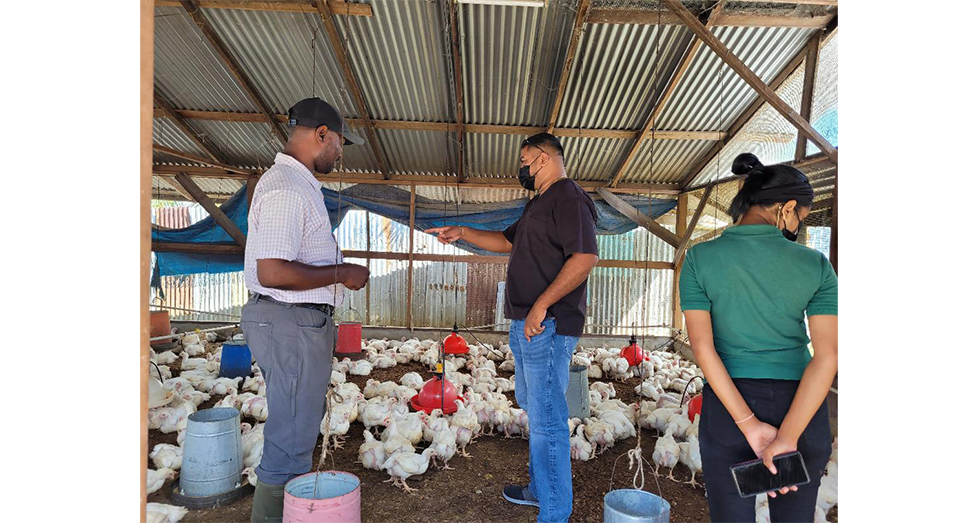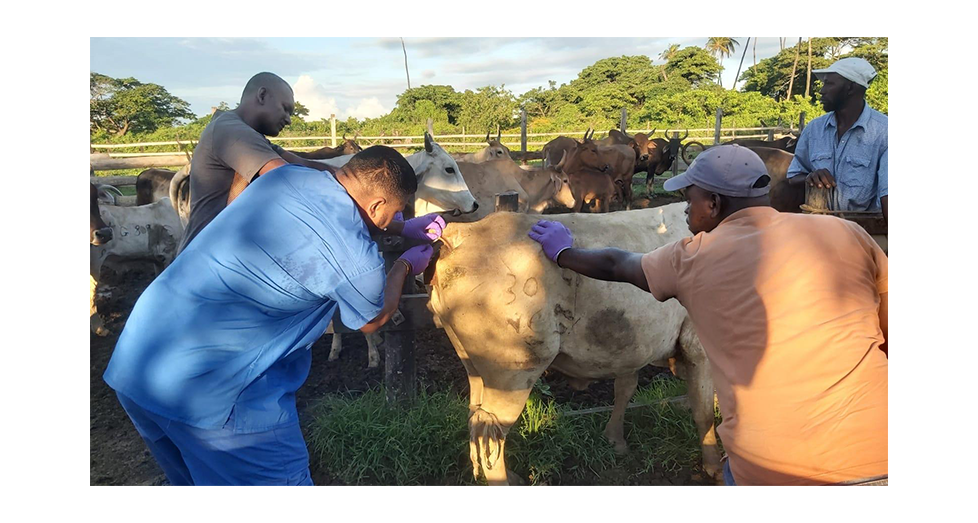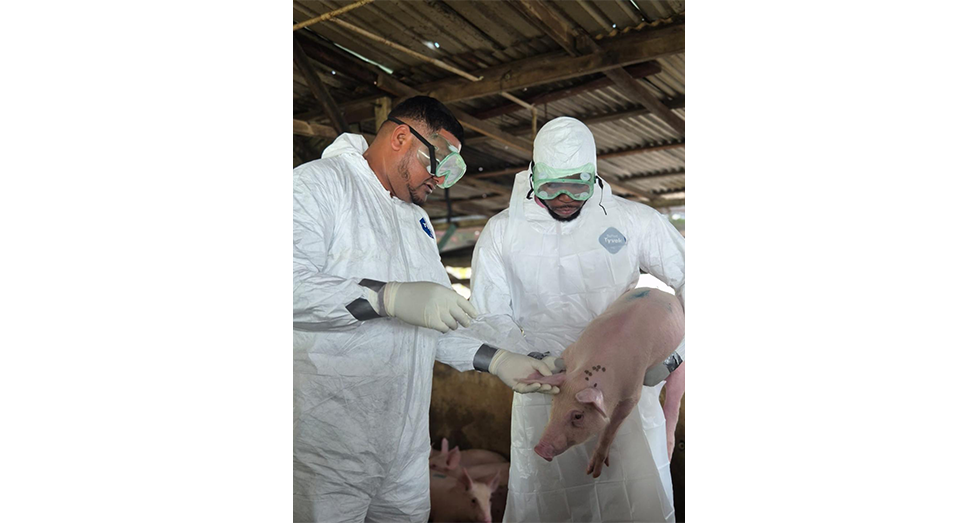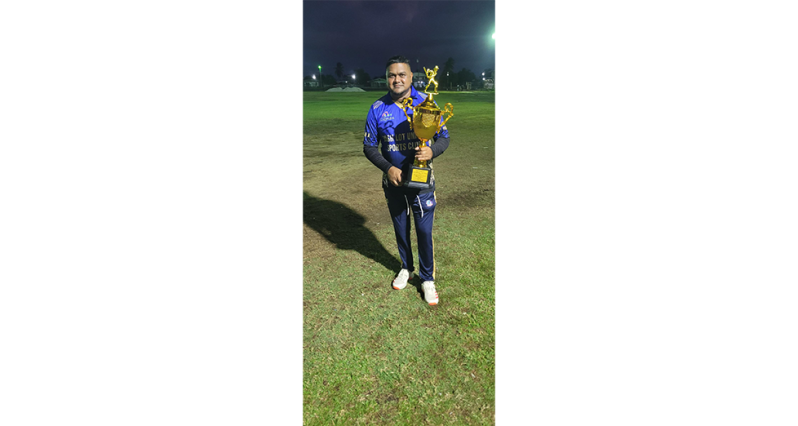GLDA’s Region Five Regional Coordinator is well-respected in his position
AMONG livestock farmers along the West Coast Berbice corridor, one name is often spoken with deep admiration and respect — Dr Joel Dilchand. Known for his calm professionalism, hands-on approach, and unrelenting commitment to service, he has become a trusted and beloved figure among farmers.
Whether he is making early-morning rounds to inspect herds or responding to late-night calls about ailing animals, Dr Dilchand never hesitates to lend his support.
“Once it is legal and within my duty, I will go out of my way to help farmers,” he said. “I’ve always believed that veterinary medicine is not just about treating animals, but about serving people and ensuring their livelihoods are protected.”

Born and raised in Queenstown Village on the Essequibo Coast, Dr Dilchand’s love for animals took root from a young age. He recalls helping his grandfather, Ramdial (Fazal), care for his Brown Swiss milking cows at Hampton Court.
“After school, I would go with him when he was feeding the cows with antelope grass mixed with molasses and stockfeed,” he shared with a smile. “When they were sick and he couldn’t handle it, he called in the veterinarian, and I would stand by to assist in measuring the doses of medication. That’s how I fell in love with livestock.”
Even today, he credits those early experiences for shaping his deep respect for animals and his passion for the field.
He attended the Anna Regina Multilateral School, where he pursued studies in agriculture and excelled both academically and practically, earning double awards of excellence. After completing eight CXC subjects in 2002, his father, Mr. Cecil Dilchand, played a pivotal role in guiding his next steps.
“One day in 2003, my father came home with a government scholarship form,” he recalled. “When I looked at the options and saw veterinary medicine and zootechnics, I knew right away what I wanted to do.” That decision marked the beginning of a life-changing journey.
He was awarded a scholarship to study in Cuba at the Universidad Central ‘Marta Abreu’ de las Villas in Santa Clara. There, he spent one year mastering Spanish and five years studying veterinary medicine and zootechnics.
“Those six years were some of the most defining years of my life,” he said. “The Cuban education system was rigorous but practical, and it really helped me develop a scientific mindset.”
He graduated in 2010 and returned to Guyana with a strong sense of duty to give back to his country. Upon his return, he joined the Ministry of Agriculture and later the newly formed Guyana Livestock Development Authority (GLDA).
One of his earliest hinterland assignments was in Region One (Barima-Waini), stationed at Port Kaituma, before being transferred to Region Five (Mahaica-Berbice), where he has since spent the majority of his professional career. In 2014, he was appointed Regional Coordinator for GLDA, overseeing the region’s animal health, breeding, and production programmes.
“Region Five has the largest livestock population in Guyana,” he noted. “It’s a challenging responsibility, but I see it as an opportunity to make a real difference in farmers’ lives.”

Dr Dilchand currently supervises a team of thirteen officers, including livestock extension officers, artificial insemination technicians, and veterinary staff. His work involves animal health surveillance, farm visits, ante-mortem inspections at slaughter poles, and the issuance of slaughter permits. He also provides veterinary reports and evidence to the police in cases involving animal cruelty or ownership disputes.
“My job goes beyond treating animals,” he explained. “It’s about ensuring food safety, protecting livelihoods, and supporting rural development.”
Dedicated to continuous learning, Dr Dilchand has undertaken several professional development programmes both nationally and internationally. These include training in foodborne disease surveillance, animal and plant health inspection in Mexico, parasitology and immunology at the University of the West Indies in Trinidad and Tobago, poultry disease response at the University of Delaware in the United States, and African Swine Fever preparedness at the University of Kansas and in Puerto Rico. He has also completed courses in Geographic Information Systems (GIS) for animal disease surveillance.
“Every training I attend adds to my ability to serve better,” he said. “Veterinary medicine keeps evolving, and we must evolve with it.”

He currently serves on the Veterinary Board of Guyana (since 2021) and as a director on the Ministry of Agriculture’s Board (MARD) since 2022.
“These roles allow me to contribute to national decision-making and policy development for the livestock industry,” he said proudly. “It’s fulfilling to be part of shaping the future of agriculture in Guyana.”
In Region Five, he leads several of the government’s major livestock initiatives, including the Barbados Black Belly Sheep Project and the Zebu Bull Rotation Programme, which involves rotating twelve bulls across different farms to improve breeding genetics.
“These programmes are transforming livestock production,” he said. “Farmers are now seeing better meat quality, increased birth weights, and more lambs born per season. It’s a major step forward for the sector.”
Dr Dilchand is quick to acknowledge that his professional growth has been supported by strong mentorship within the GLDA.
“I am always grateful to Dr Dwight Walrond, Dr Tihul, and Dr Bowen,” he said. “They are astute leaders with deep knowledge of the industry and are always willing to provide guidance and encouragement. Their leadership style promotes growth, teamwork, and professionalism.”
He also extended appreciation to the Minister of Agriculture, Hon. Zulfikar Mustapha, for the confidence placed in him to lead Region Five’s livestock development.
“The success of this region is a collective effort,” he emphasised. “It reflects the dedication of our farmers, the commitment of my staff, and the vision of our leadership. Our success is built on humility, collaboration, and a balance between traditional practices and modern science.”

Beyond his professional life, sports have played a major role in shaping Dr Dilchand’s character. A talented cricketer, he represented Guyana at the Under-15 level and later played junior cricket for Essequibo. Since 2015, he has captained the Bush Lot Unity Sports Club.
“Cricket taught me discipline, teamwork, and patience,” he reflected. “Those same lessons guide me every day in my work as a veterinarian and leader.” While studying in Cuba, he also played basketball for his faculty — balancing academics with athletics as a reflection of his commitment to holistic growth.
Now residing in Bush Lot, West Coast Berbice, Dr Dilchand is the proud father of one daughter and the only veterinarian in his family. His father, Cecil, retired from the Ministry of Public Works after forty-five years of service, and both parents continue to support and encourage him.
“My parents have been my greatest motivators,” he said warmly. “My father especially was the one who helped me find my path, and I’m forever grateful for his guidance.”
Reflecting on his journey, Dr Dilchand said, “Working with farmers keeps me grounded. They remind me every day why I chose this career — to serve, to protect animal health, and to contribute to Guyana’s food security.”
After fifteen years with GLDA, he remains passionate and committed to improving the livestock industry. “I am proud of what we’ve accomplished as a team,” he said. “There is still much to be done, but I believe that with dedication, humility, and collaboration, the future of livestock farming in Guyana is bright.”
From a boy tending to his grandfather’s cows in Hampton Court to leading the country’s livestock capital, Dr Joel Dilchand’s journey is a testament to the power of hard work, service, and purpose. To the farmers of Region Five, he is not only their veterinarian but also their friend, mentor, and advocate — a man whose legacy continues to inspire the next generation of agricultural professionals in Guyana.




.jpg)










